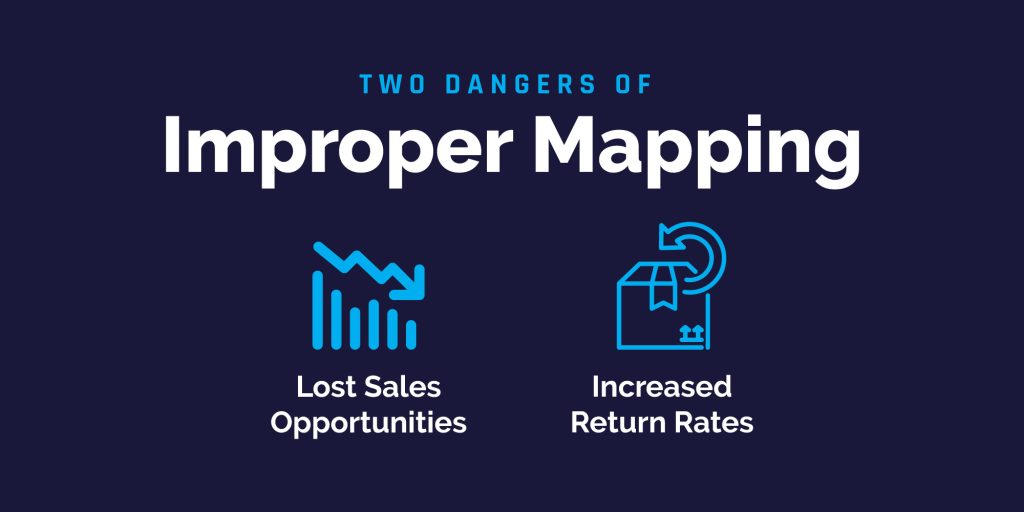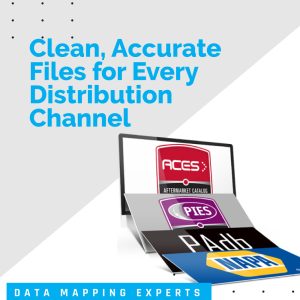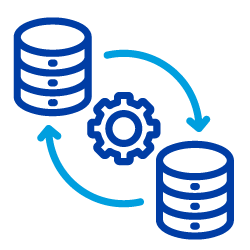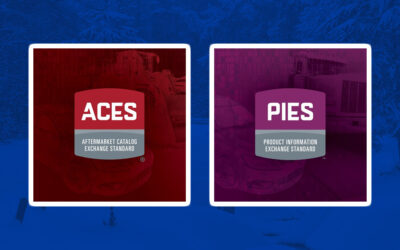Maybe you’re just getting started with data mapping and need the basics to help guide you through the process. Or you may be at the point where you are considering moving beyond a do-it-yourself approach—filled with cumbersome text files and spreadsheets—to a more professional and easier-to-update solution.
Either way, this article is for you!
With over 35 years of automotive experience, we’ll cover everything from what data mapping is to key things you should consider when evaluating potential data mapping partners.
Ready to go? Let’s get started with a few basics.
The Basics of Automotive Data Mapping
What is Data Mapping and Why is it so Important?
In simple terms, data mapping is the process of grouping key data points (information) so they can then be read and understood by another system. Think of data mapping as the preparation work that allows two separate systems to find and display information from a single data file.
In the automotive aftermarket industry, these data points include everything from engine size to part weight. By properly mapping your data, other systems can find and display each and every detail about your part to the potential customers searching for solutions. This ability to quickly identify parts greatly expedites the buying process and drives sales.
However, the opposite is also true. Having an improperly mapped file that doesn’t display the correct information can result in lost sales opportunities or increased returns. This is why it’s crucial to ensure your parts’ data is properly and professionally mapped.
Standardization in the Automotive Industry
 To make the exchange of data easy throughout the automotive industry, standards have been adopted.
To make the exchange of data easy throughout the automotive industry, standards have been adopted.
You’ve likely heard of or had someone request your ACES or PIES files. ACES files power year/make/model/engine lookups used throughout the industry while PIES files populate product information such as weight, measurements, materials, or even marketing literature.
In addition to ACES and PIES files, some partners have proprietary mapping requirements that we will discuss later in key considerations for choosing your mapping partner.
Not All Files Are Equal
While standardization has created the guide for file creation, it’s important to keep in mind that just because someone says they can create an ACES, PIES, or other data file for you doesn’t mean it’s a high-quality file.
Unfortunately, we often see low-quality (dirty) files that have been sold as compliant. The vendors either lack the experience to create clean files or try to cut corners along the way. These files often have overlaps, duplicates, or over-mapping issues that result in them being rejected by channel partners.
Either way, their customers are left with a sinking and frustrating feeling when the file sold as meeting industry standards is rejected by their partner.
Key Considerations for Choosing Your Parts Mapping Partner
Now that you have the basics of data mapping down, let’s cover a few key considerations to keep in mind when choosing your automotive parts mapping partner.
Ability to Create Files for NAPA PartsPro, Amazon, Ebay & More…
 The internet has created a growing number of new channels to promote and sell products. While many of these channels continue to use ACES & PIES, a growing number have proprietary file structures. This is why it’s important to consider all of the places you may need to send your data before starting a mapping project.
The internet has created a growing number of new channels to promote and sell products. While many of these channels continue to use ACES & PIES, a growing number have proprietary file structures. This is why it’s important to consider all of the places you may need to send your data before starting a mapping project.
One benefit of choosing Vertical Development for your next mapping project is our vast experience in the automotive industry. It’s our experience and knowledge that allow us the unique advantage of being able to create NAPA PartsPro files. And it’s that same experience that has earned us “Preferred Vendor” status from Amazon.
Navigating the various partner data requirements can be challenging, so make sure your data mapping partner can help you cross the finish line successfully no matter the challenge.
File Acceptance Guarantee
Speaking of crossing the finish line, be sure to ask how rejected files will be handled. Some vendors will charge additional fees to fix files that have been rejected by a partner, increasing the cost of the project.
At Vertical Development, each project comes with our guaranteed file acceptance. If for some rare reason your file is rejected, we’ll fix it at no additional cost.
Proactive Data Mapping Improvements
As your product line grows, reviewing your data to ensure it is accurate will become a bigger challenge. When selecting a data mapping partner, you’ll want to look for a company that proactively looks for missing or suboptimal data that might result in lost sales.
As an example, we offer a comprehensive “Holes Report” once the data is initially mapped to help provide more comprehensive clean data. By identifying and filling these holes, we help clients develop very accurate catalog files that function flawlessly.
In summary, look for a data mapping partner that is pushing towards best practices rather than one simply meeting minimum requirements.
What Happens When You Grow?
Growth should be a good thing in business. Actually, it’s a great thing.
However, growth can also mean outgrowing past solutions and data mapping is no exception. A great thing to ask potential mapping vendors is what happens if your organization grows to the point where it makes sense to hire an internal catalog manager? Will you be able to seamlessly move your cataloging in-house?
At Vertical Development, we don’t have a standalone mapping system. Instead, we load our customers’ data directly into our industry-leading catalog system. This allows us to create and manage each of the great files our customers need. It also allows us to offer a seamless and pain-free pass-off when our customers grow. Clients can simply purchase our catalog system and we’ll hand everything off so you are up and running on day one.
Planning ahead and ensuring your cataloging can grow with you will help eliminate future headaches.
What Support Does Your Mapping Partner Offer?
A final thing to ask your mapping vendor is what type of support they offer. If something goes wrong, you’ll want to address it quickly and easily.
With Vertical Development, you can have peace of mind knowing that our team is based in Chicago and available from 9-5 CST to answer your questions and help guide you through the process. Our team includes former catalog managers who understand your needs and can guide you to solutions that best fit your organization.
In Conclusion
Hopefully, this article has provided you with the basics of data mapping as well as key considerations for vetting potential vendors.
If you’re ready to make the jump to professional data mapping and cataloging, our team is here to help you get started.
Simply schedule a call and we can help guide you through each step of the process, no matter your starting point!









